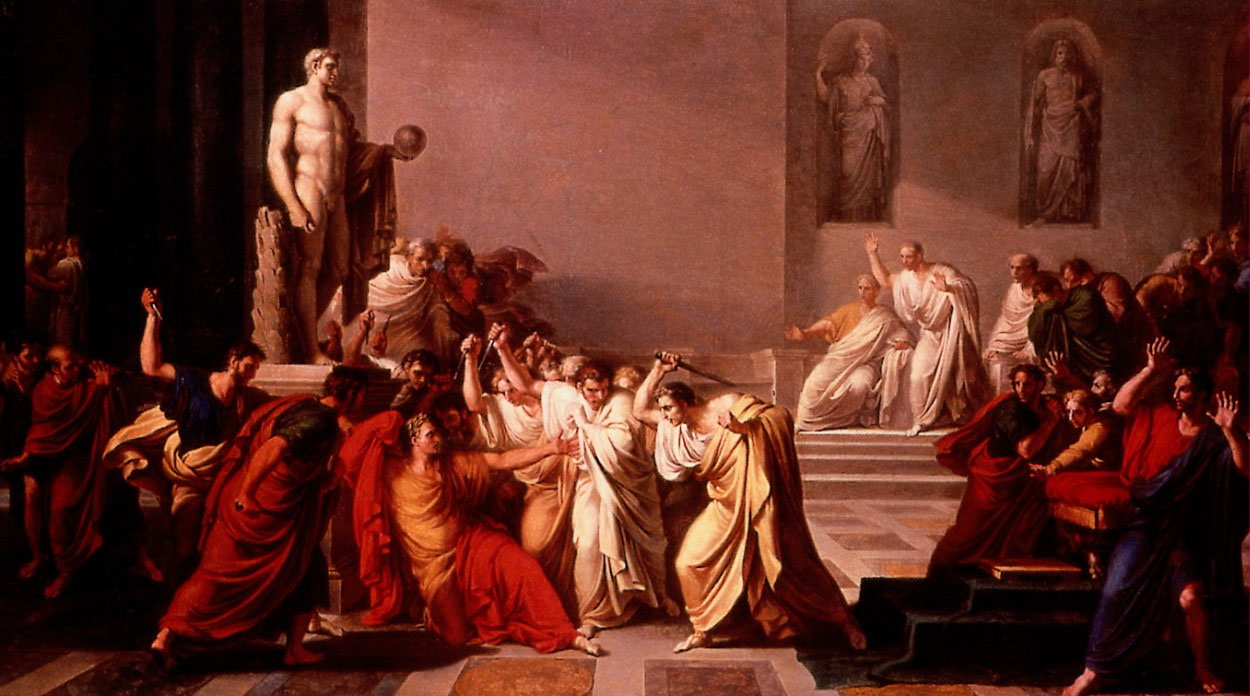July 11, 2009:
Initially, Brutus had viewed himself as a servant to Cæsar, he had a powerful, seemingly unbreakable loyalty.
“I would not, Cassius; yet I love him well.
But wherefore do you hold me here so long?
What is it that you would impart to me?
If it be aught toward the general good,
Set honour in one eye and death i' the other,
And I will look on both indifferently,
For let the gods so speed me as I love
The name of honour more than I fear death.”
He was willing to take the proverbial bullet for Cæsar initially, yet, this may not have been truly out of love for him. Rather, it was out of a sense of duty, that if this was not done, he was a traitor to his country, his fellowman, and all that Rome stood for. He believed that anyone who was to do anything of the sort, to even consider it, was to be shunned in the current life, and the figurative ‘next’.
Yet, despite all this, something drove him to betray Cæsar. It wasn’t out of love for Cæsar, rather, it was something that has had a powerful effect on history. It has triggered wars, conspiracies, crime, and much hard labor. It was fear. Fear drove Brutus to betray Cæsar, his beloved Cæsar! This doesn’t mean that his conscience didn’t affect him, however. Portia had taken notice.
“You've ungently, Brutus,
Stole from my bed: and yesternight, at supper,
You suddenly arose, and walk'd about,
Musing and sighing, with your arms across,
And when I ask'd you what the matter was,
You stared upon me with ungentle looks;
I urged you further; then you scratch'd your head,
And too impatiently stamp'd with your foot;
Yet I insisted, yet you answer'd not,
But, with an angry wafture of your hand,
Gave sign for me to leave you: so I did;”
Despite his powerful feelings against harming Cæsar, he feels it must be done.

In his
eyes, Cæsar has grown far too powerful. He is worshipped by too many people, and giving him such influence could have devastating effects should Cæsar turn aside from the people of Rome, towards his own selfish desires.
Cassius and Brutus have a unique relationship in the play. Initially, Cassius viewed Brutus as stubborn, and foolish for his allegiance to Cæsar. Brutus dismissed Cassius as simply another naysayer, jealous of “divine” Cæsar. But after some persuasion (some of which involving deception), and the impalement of Cæsar, Brutus accepts Cassius as his comrade. Thus, the two become ‘friends’, although the friendship was rather one sided in loyalties.
The concept central to the play was one of power. Power corrupts. Absolute power corrupts absolutely. Yet, it wasn’t the regular type of power, but the power of fear, which can be a driving force. Fear can stop crimes, or cause them to occur. Fear can save lives, and extinguish them in the blink of an eye. Fear of corruption led to the death of Cæsar, yet, it most likely led Rome to a new age, the Pax Romana (Roman Peace) in fact. However, during his life, Cæsar brought about great reform to Rome. Perhaps he would have made Rome even better had he lived longer.
“BRUTUS
What means this shouting? I do fear, the people
Choose Caesar for their king.
CASSIUS
Ay, do you fear it?
Then must I think you would not have it so.”
Another core idea to the play was that of loyalty, and how it’s rooted. Poor Brutus had felt that his allegiance to Cæsar was solid, and unbreakable. Cassius, on the other hand, was quite independent of Cæsar, and remained loyal to himself. Because of this self-centered loyalty, and the fact that nobody really knew or cared about it, his loyalty was unbroken. Yet, when it came to Brutus, his loyalty was slowly chipped away at, to the point where it simply snapped under the pressure, needing no more encouragement. Still, this change in loyalty comes at a price. He is emotionally numbed, the death of his wife (by suicide, no less) leaves him unaffected. He simply does not care anymore about what seems to happen, simply because he feels that his life is of no use. He killed his beloved Cæsar, and is now in cahoots with the men who helped kill him! He placed all his loyalty in one place, and then another, and because these places were both moot points, he has nowhere to put his loyalty. Because he feels that he has nobody, he ends his own life. If he doesn’t serve anybody, he has nothing. The trouble is, he never took the time to serve himself.
 I leave you only this picture as a clue.
I leave you only this picture as a clue. In his
In his